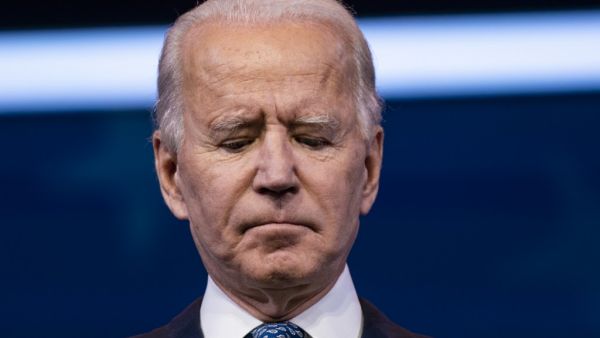The enthusiasm of decision-makers in Jordan about the advent of a new US administration headed by Democrat Joe Biden is on the wane.
According to sources in Jordan, who spoke on condition of anonymity, there are already signals that indicate the US interest in the kingdom as a strategic ally in the region may not return, at least in the near future.
Biden, who will assume the presidency on January 20, has many thorny files that he needs to deal with, including clearing the chaos left by the administration of US President Donald Trump, the challenges posed by growing Chinese and Russian influence, as well as the coronavirus pandemic that does not seem to be on the verge of ending with the emergence of new strains that may be more aggressive and deadly.
?NEW: Emails obtained by FBI detail how Hunter Biden landed Ukrainian gas gig in 2014. Memos show concerted strategy to leverage VP Joe Biden’s trip to Kiev to score Burisma Holdings deal. @jsolomonReports @JustTheNews https://t.co/PJa27B3xwf
— Jenna Ellis (@JennaEllisEsq) December 23, 2020
Jordan was among several countries looking forward to the end of Trump’s mandate, especially as the latter’s policies pushed the Arab country to the sidelines of regional developments.
Trump, a Republican, has focused on making a radical shift on the level of geopolitical relations in the region through the Abraham Accords that his administration sponsored.
These agreements are expected to yield a major breakthrough in Israeli-Gulf relations, with a new alliance likely to emerge so as to address common threats, including from Iran.
Analysts and former Jordanian officials believe that Biden is not expected to scrap everything that has been achieved in the region, including peace agreements between Israel and Arab countries.
The Democratic president-elect, according to observers, will not focus on the process of advancing peace between Palestinians and Israelis in the first months of his mandate, which appears to have disappointed Jordan.
Former Jordanian Foreign Minister Marwan Muasher said he expected the Biden administration to avoid making any big decisions on the Palestinian-Israeli conflict.
If the Biden administration does attend to the file, he said, it would likely simply issue a statement reiterating Washington’s commitment to a two-state solution.
In a recent seminar in Amman, Muasher explained that the Trump administration completely ignored Jordan’s role and expected that Jordanian-American relations would likely improve under the new administration.
I don't think I'm gonna take your criticism of our POTUS45 anymore @JoeBiden! Go trip over another carpet again but this time break your Fuc**** neck you filthy cheat! https://t.co/1Ln1DsSdyC
— kristinevessey@aol.com (@kristinevessey1) December 23, 2020
With Democrats in power, Jordan’s relations with Washington traditionally grow stronger, especially as Amman boasts good ties with political circles within the Democratic camp.
Other priorities, however, are likely to grab the attention of the Biden administration, which Jordan seems aware of as it strives to keep pace with ongoing transformations in the region.
Amid the changing dynamics, Jordan appears keen to break the stalemate in its relationship with Israel, with Jordanian Foreign Minister Ayman Safadi meeting with his Israeli counterpart Gabi Ashkenazi about three weeks ago.
The Safadi-Ashkenazi talks, during the first high-level meeting in years, came ahead of the announcement of an Open Skies Agreement.
In parallel, Jordan’s monarch, King Abdullah II, rushed to strengthen rapprochement with Arab Gulf states, especially those that signed peace agreements with Israel, hoping to overcome some of the troubles that have marred relations in recent years.
A month after his visit to the United Arab Emirates, the Jordanian monarch on Monday visited Bahrain and met with King Hamad bin Isa Al Khalifa. During the meeting, which was held at Sakhir Palace, the two sides discussed bilateral relations and developments in the region.
Israeli media sources spoke a few days ago about a Jordanian-Emirati-Bahraini agreement to facilitate the influx of Gulf tourists to Jerusalem.
Observers believe that Jordan is trying to find a place for itself amid the changing dynamics produced by the Abraham Accords.
Amman, observers say, believes the current course of developments in the region will continue even with a new Democratic administration in the US.
Jordan is not the only regional player to reshuffle its cards. Many other countries have already begun to reconsider their positions, even though they are in a better position than Jordan, politically and economically.
What is happening in the region “is an alliance of a strategic nature, and the structures of this alliance will replace the old structures that we have known in the past,” said journalist Orib al-Rantawi.
In a symposium held by the Al-Sabeel Media Forum on Saturday, Rantawi spoke about the implications of Biden’s victory for Jordan, noting that “Israel no longer relies greatly on Jordan’s role.”
Jordan signed a peace agreement, known as the Wadi Araba, with Israel in 1994, and has succeeded in investing in this deal in order to strengthen its political position in the region by playing the role of mediator.
However, after the rise of Israel’s right-wing movement to power, the situation dramatically changed and there was a lack of chemistry between the two parties.
Jordanian-Israeli relations reached their most tense moment in 2017, when two Jordanians were killed inside the Israeli Embassy in Amman.
Today, with the the kingdom no loner playing as strong a role as mediator after the signing of the Abraham Accords, Tel Aviv is no longer interested in bolstering its relationship with Jordan, despite calls from within the Israeli security and military institutions for it to do so.
This article has been adapted from its original source.








